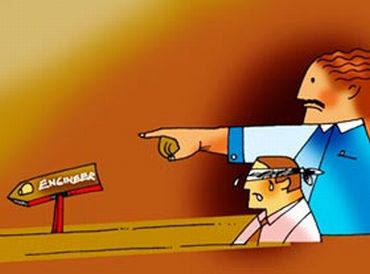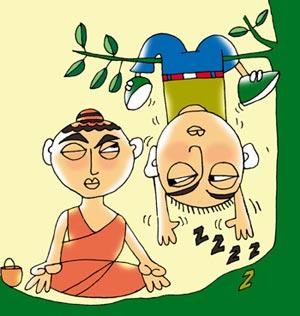
It's that time of year again -- the board exams are about to begin and most students are in a mad scramble with their books, and are cramming again. And as the dates approach, the anxiety has started creeping into young people's minds.
But it is possible to cope with the pressure of examinations and do well without exhausting yourself, say mental health professionals and doctors. All you need to do is understand what stress is, how it occurs, and follow the right diet and exercise.
Parents and teachers have begun to fear that children don't eat properly and tax themselves both physically and mentally, but stress management therapist and lecturer Dr Ann McCracken, who is also director of the International Stress Management Association in the UK, says that stress is not about every day life hassles; these are routine things that all of us manage to deal with.
At a panel discussion held in Mumbai, and organised by Horlicks and the International Stress Management Association (ISMA) recently, she spoke about how stress is actually about worry. And if there's one thing that is known to trigger worry in children, it is the tension of exams.
Identifying stress
Dr McCracken says that some of the most immediate ways to find out if a child is under stress is when his or her behaviour changes drastically, or when you find that the child's immune system has become weaker. Stress reduces the capacity of the immune system, and children can become prone to far more colds, fevers, and coughs than they usually did in the past.
However, there are also other short term effects that are much trickier to catch.
...

Some of the most obviously visible side effects can include demotivation and a feeling of disinterest in whatever one does, along with symptoms of short-term memory loss. Dr McCracken says that short term memory loss results when you are not able to remember what you perhaps read only yesterday, though you may remember it much later.
"There's a difference between pressure and stress," says she. "Reasonable amount of pressure is good, but when it goes overboard it can create stress. If a child is being pressurised too much, it can make him feel extremely stressful," she adds.
But the flip side is that too little pressure also creates stress.
"I know people who feel they are not being adequately challenged on a day-to-day basis. Inadequate amount of challenge and pressure can create boredom, and boredom makes you feel stressed out too," she says.
So what's behind stress?
According to Dr McCracken, stress has got to do more with overall thinking patterns and tendencies of worrying, than it has with mere body reflexes. "It is important to make sure that children do not worry; they must be taught anti-worrying techniques that help them to stop doing so."


1. Praise the steps to success. Make sure you appreciate what the child is doing in order to improve, and make sure you encourage it.
2. Encourage learning and living in different ways. Mind mapping is the process of trying different ways of learning. For instance, for some children, it is easier to learn through visual mediums, whereas for others, it might work to record information on an mp3 and then listen to it -- even while they are sleeping. Different methods can be effective for different children, and if a child is trying to do this on their own, encourage it. These methods of innovative learning can be applied to any situation, and is a sign of creativity.
3. Avoid unnecessary conflicts. Try to negotiate with the child's needs, instead of continuously nagging and giving suggestions of what you think is right. Find a way to deal with things in such a way that the child also feels he has got what he wants, and so do you. Look for a win-win situation.

4. Encourage regular breaks. Make sure he or she gets a break from work or studies. Without taking a break, it is often difficult to concentrate and can lead to stress.
5. Encourage doing things that are fun, in the right proportion. Fun things can include surfing online, using facebook, twitter, social networking, reading, watching movies, and enjoying entertainment. Encourage anything that refreshes the child's mind.
6. Encourage a sport. It doesn't have to be an official sport, and neither does it need to be a competitive game. Simply a sport that keeps you fit will keep the mind and body healthy.
7. Get good sleep. Don't place the television set in the child's room: it can be distracting at night. Make sure the child does not watch something mind-activating like a horror flick at night. Having relaxing things around at night before bed time reduces fears and anxieties.

8. Yoga and meditation. These balance out the body's energies, and can help calm down the child's senses.
9. Try this simple exercise. Dr McCracken also shares a certain specific exercise to destress you.
Stretch both arms ahead with your fingers locked and intertwined within each other. Later, touch your left palm to your right knee by bending and hoisting the knee simultaneously. Immediately and in quick succession, touch your right palm to your left knee by bending and hoisting the knee simultaneously again.
Keep repeating this process for a couple of minutes.

Health and fitness
Parents and teachers in the audience voiced their concern about the poor eating habits of children, as someone even mentioned children fainting during school hours. So how should it be ensured that children are fed properly -- both during school lunch hours as well as at home in the evenings?
Monitoring the lunch menu, for one, is a good idea; and so is the idea of bringing parents together to brief them on important nutritional values -- suggested Dr Panchali Moitra, nutritionist, who was part of the panel.
"Fitness is not just about the commercial size zero and all the muscle packs. It's about muscular and cardiovascular strength and endurance, and it is about flexibility," emphasised Huzefa Lokhandwala, fitness expert.
Lokhandwala, along with nutritionists Dr Moitra and Dr Munira Jawadwala, gave the audience some key tips to break out of harmful stress patterns.
1. Take a jog, run, or swim once a day. This improves blood circulation and charges you up.
2. Have fresh fruits and vegetables. Light and heat destroy many proteins in fruits. It is far more beneficial, therefore, to eat them fresh, and not keep them stored or preserved for too long.
3. Avoid eating too much rice as it can make you feel sleepy. It has carbohydrates that secrete serotonin in your brain, and this can make you drowsy.
4. Take a steady intake of sugar. Eat foods that release sugar and energy into your brain slowly, and in a sustained manner. For this, you must have complex carbohydrates, and not simple carbohydrates.
Eat fibre-rich food like green leafy vegetables and fruits, which are made of the essential complex carbohydrates. Avoid foods like bread and pasta, which are made of simple carbohydrates. They release energy and blood sugar too fast and too instantly in your body, and lead to a drastic drop in your energy levels later, creating what doctors call a "yo-yo effect".
